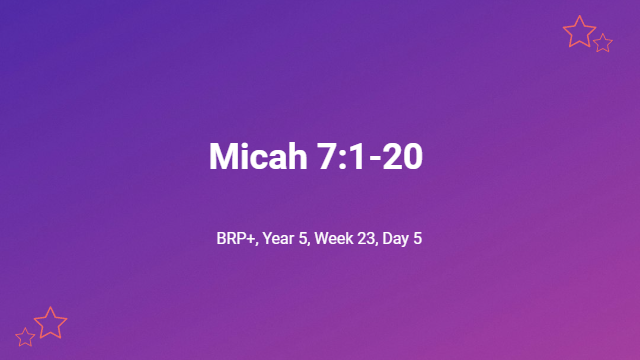Micah 7:1-20
Q.1. What was the state of the nation? What had happened to the upright? How did Israel’s condition compare with that in the Last Days spoken of by the Apostles? – (Mic.7:1-6 c.f. Mt.24:9-12; 2 Tim.3:1-5)
It was thoroughly depressing for Micah to minister to his people. It seemed to him that – The godly person has perished from the land, and there is no upright person among men. All of them lie in wait for bloodshed; Each of them hunts the other with a net (Mic.7:2). How he described the nation, reads like the prophecies of Jesus and the apostles regarding the Last Days – For son treats father contemptuously, daughter rises up against her mother, daughter-in-law against her mother-in-law; A man’s enemies are the men of his own household (Mic.7:6 c.f. Mt 24:9-12, 2 Tim.3:1-5).
Q.2. What was the prophet’s own approach to Israel’s judgment? Why did he not lose hope? When will a change of fortunes take place? – (Mic.7:7-13 c.f. Amos 9:11)
Micah was not just a prophetic voice. He was a real shepherd who identified with the plight of his people. On behalf of them and the coming Messiah, he wrote – 7 But as for me, I will watch expectantly for the Lord; I will wait for the God of my salvation. My God will hear me. 8 Do not rejoice over me, O my enemy. Though I fall I will rise; Though I dwell in darkness, the Lord is a light for me. 9 I will bear the indignation of the Lord because I have sinned against Him, until He pleads my case and executes justice for me. He will bring me out to the light, and I will see His righteousness (Mic.7:7-9 c.f. Ps.37:23-25). Like the Saviour, Micah accepted that judgment against sin must fall. He had absolute confidence that he would rise again and see the light, but he knew that day was sometime in the future, after God’s judgment of Planet Earth (Mic.7:11-13 c.f. Mic.4:1-2).
Q.3. What appeal did Micah bring to Israel? Would Israel’s enemies always prevail? On Whom did Micah base his confidence and hope? Can we have the same assurance? – (Mic.7:14-20)
Just as the prophet had been a faithful shepherd, so he called on the Lord to shepherd Israel, as He had done in the past (Mic.7:14-15; Ps.78:70-72). Micah foreshadowed a time when God will shame the nations for the way they have treated His people. This hope was founded on his view of God, which he highlighted as he asked and declared – 18 Who is a God like You, who pardons iniquity and passes over the rebellious act of the remnant of His possession? He does not retain His anger forever, because He delights in unchanging love. 19 He will again have compassion on us; He will tread our iniquities under foot. Yes, You will cast all their sins into the depths of the sea. You will give truth to Jacob and unchanging love to Abraham, which You swore to our forefathers from the days of old (Mic.7:18-20). Micah clung to the character and promises of God, as revealed earlier in a Psalm of David – 8 The Lord is compassionate and gracious, slow to anger and abounding in lovingkindness. 9 He will not always strive with us, nor will He keep His anger forever. 10 He has not dealt with us according to our sins, nor rewarded us according to our iniquities. 11 For as high as the heavens are above the earth, so great is His lovingkindness toward those who fear Him. 12 As far as the east is from the west, so far has He removed our transgressions from us. 13 Just as a father has compassion on his children, so the Lord has compassion on those who fear Him. 14 For He Himself knows our frame; He is mindful that we are but dust (Ps.103:8-14). Indeed, the only hope that any of us has, is that this is the nature of the God of the Bible.

